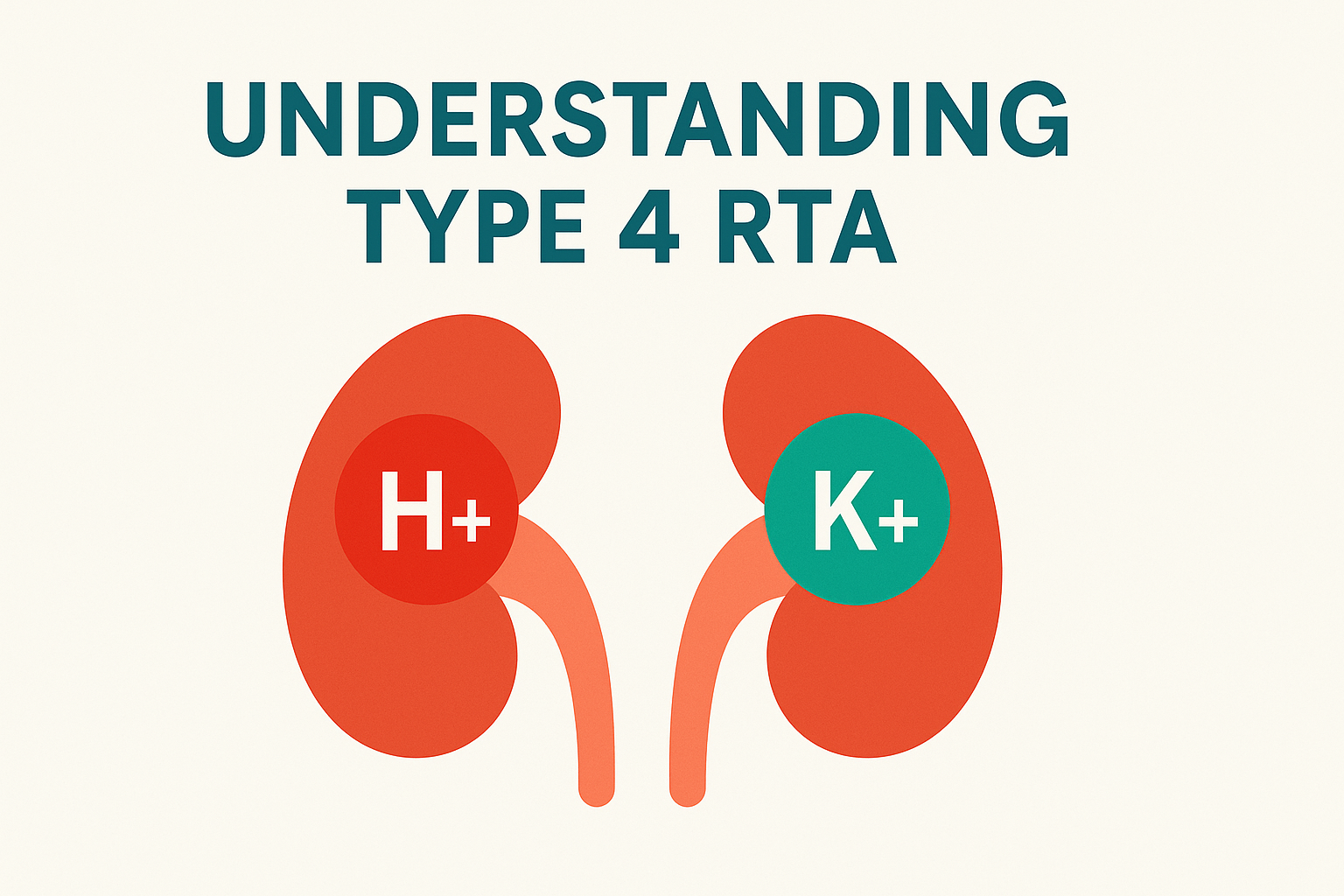Medically Reviewed and Compiled by Dr. Adam N. Khan, MD.
What Exactly is Renal Tubular Acidosis Type 4?
To understand Renal Tubular Acidosis Type 4 (RTA 4), it helps to think of your kidneys as a high-tech filtration plant. Their job isn’t just to make urine; they manage the delicate chemical balance of your blood.
What Exactly is Renal Tubular Acidosis Type 4?
To understand Renal Tubular Acidosis Type 4 (RTA 4), it helps to think of your kidneys as a high-tech filtration plant. Their job isn’t just to make urine; they manage the delicate chemical balance of your blood.
Usually, your kidneys get rid of acid and keep the right amount of potassium. In RTA 4, this system hits a snag. Unlike other types of RTA, Type 4 is unique because it involves a “double whammy”: your blood becomes too acidic (acidosis), and your potassium levels climb too high (hyperkalemia).
In 2026, we view RTA 4 not just as a kidney glitch, but often as a symptom of how your body handles a specific hormone called aldosterone. When this hormone is missing or ignored by the kidneys, the whole balancing act falls apart.
Common Causes: Why Does It Happen?
Most people don’t just wake up with RTA 4. It is usually a “secondary” condition, meaning it’s caused by another underlying health issue. Here are the most common culprits:
1. Diabetes Mellitus
This is the leading cause. Over time, high blood sugar can damage the nerves and small blood vessels in the kidneys. This damage often leads to hyporeninemic hypoaldosteronism—a fancy way of saying your kidneys stop signaling for the hormones that manage potassium.
2. Chronic Kidney Disease (CKD)
As kidney function slows down, the tubes (tubules) inside the kidney become less efficient at swapping ions. This buildup of waste leads directly to the acidic environment seen in RTA 4.
3. Medications (The “Hidden” Cause)
Sometimes, the drugs saving your life can cause RTA 4 as a side effect. Common offenders include:
- NSAIDs: Common over-the-counter pain relievers like ibuprofen.
- ACE Inhibitors & ARBs: Used for blood pressure.
- Potassium-sparing diuretics: Drugs like spironolactone.
- Heparin: A blood thinner.
4. Adrenal Gland Issues
Since the adrenal glands produce aldosterone, any condition that damages them (like Addison’s disease) can trigger Type 4 RTA.
Symptoms: Signs You Should Watch For
The tricky part about RTA 4 is that it is often “silent” in the early stages. Many people don’t feel “sick” until their potassium levels reach a dangerous point. However, as the acid builds up, you might notice:
- Muscle Weakness: High potassium interferes with how muscles contract.
- Fatigue: Feeling drained or sluggish even after a full night’s sleep.
- Arrhythmia: A fluttering feeling in the chest or an irregular heartbeat.
- Nausea: A general feeling of stomach upset or lack of appetite.
- Stunted Growth: In children, untreated RTA 4 can lead to shorter stature or slower development.
Important Note: If you experience sudden chest pain or extreme muscle paralysis, seek emergency care immediately, as these can be signs of critically high potassium levels.
How Doctors Diagnose RTA 4
If your doctor suspects an issue, they won’t just guess. They use a series of specific tests to see exactly what is happening in your chemistry.
Blood Chemistry Panel
This is the first step. The doctor looks for low bicarbonate levels (indicating acidity) and high potassium levels.
Urinalysis
A key marker for RTA 4 is the Urine pH. Interestingly, in Type 4, the urine pH is usually lower than 5.5. This helps doctors distinguish it from Type 1 RTA, where the urine is not acidic enough.
Transtubular Potassium Gradient (TTKG)
This is a calculation doctors use to see if the kidneys are responding correctly to aldosterone. It tells them if the problem is in the kidney itself or if the body just isn’t producing enough hormones.
2026 Treatment Standards: Getting Back to Balance
The goal of treating RTA 4 is simple: lower the potassium and neutralize the acid. Here is how modern medicine tackles the problem:
1. Managing the Underlying Condition
If diabetes is the cause, getting blood sugar under strict control is priority number one. If a medication is causing it, your doctor may swap that drug for a kidney-friendly alternative.
2. Diet Modifications
In 2026, we emphasize “Food as Medicine.” A low-potassium diet is crucial. This means limiting:
- Bananas and Oranges
- Potatoes and Tomatoes
- Spinach and Swiss Chard
3. Medications
- Loop Diuretics: These help the kidneys flush out extra potassium.
- Sodium Bicarbonate: Essentially medical-grade baking soda, which neutralizes the acid in the blood.
- Fludrocortisone: A synthetic hormone that acts like aldosterone to help the kidneys function properly.
Living with RTA 4: Long-term Outlook
With proper management, most people with RTA 4 live normal, active lives. The key is consistency. Missing your medication or ignoring your diet can cause potassium levels to spike quickly, which can be dangerous for the heart.
Regular check-ups (usually every 3 to 6 months) are standard to monitor your electrolyte levels and ensure your kidneys aren’t under too much stress.
Summary Table: RTA Type 4 at a Glance
| Feature | Description |
| Primary Issue | High Potassium & High Acid |
| Main Cause | Diabetes & Kidney Disease |
| Urine pH | Usually < 5.5 (Acidic) |
| Key Treatment | Low potassium diet & Diuretics |
| Risk Factor | Heart Arrhythmia |
Medlifeguide give information about also kidney diseases, chronic kidney disease (CKD) and also diet plans for kidney health; reach out to acheive these information for your and your family’s health
Medical Disclaimer
All content published on medlifeguide is intended for informational and educational purposes only and does not substitute professional medical advice, diagnosis, or treatment. Always consult a qualified healthcare provider regarding any medical condition, symptoms, or treatment decisions.

